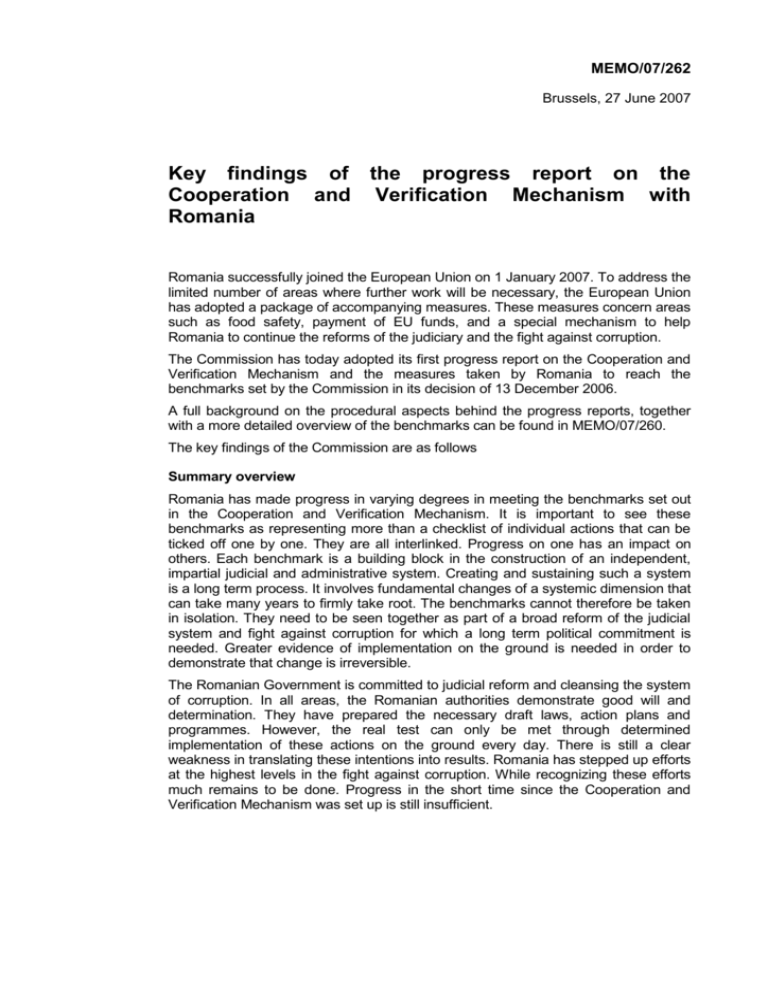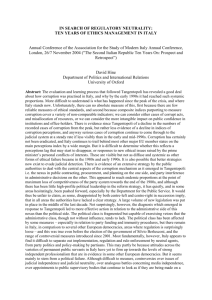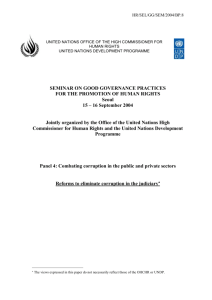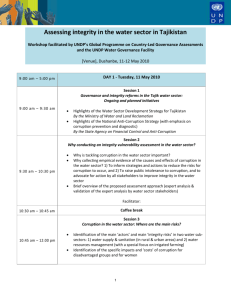DOC - Europa
advertisement

MEMO/07/262 Brussels, 27 June 2007 Key findings of the progress report on the Cooperation and Verification Mechanism with Romania Romania successfully joined the European Union on 1 January 2007. To address the limited number of areas where further work will be necessary, the European Union has adopted a package of accompanying measures. These measures concern areas such as food safety, payment of EU funds, and a special mechanism to help Romania to continue the reforms of the judiciary and the fight against corruption. The Commission has today adopted its first progress report on the Cooperation and Verification Mechanism and the measures taken by Romania to reach the benchmarks set by the Commission in its decision of 13 December 2006. A full background on the procedural aspects behind the progress reports, together with a more detailed overview of the benchmarks can be found in MEMO/07/260. The key findings of the Commission are as follows Summary overview Romania has made progress in varying degrees in meeting the benchmarks set out in the Cooperation and Verification Mechanism. It is important to see these benchmarks as representing more than a checklist of individual actions that can be ticked off one by one. They are all interlinked. Progress on one has an impact on others. Each benchmark is a building block in the construction of an independent, impartial judicial and administrative system. Creating and sustaining such a system is a long term process. It involves fundamental changes of a systemic dimension that can take many years to firmly take root. The benchmarks cannot therefore be taken in isolation. They need to be seen together as part of a broad reform of the judicial system and fight against corruption for which a long term political commitment is needed. Greater evidence of implementation on the ground is needed in order to demonstrate that change is irreversible. The Romanian Government is committed to judicial reform and cleansing the system of corruption. In all areas, the Romanian authorities demonstrate good will and determination. They have prepared the necessary draft laws, action plans and programmes. However, the real test can only be met through determined implementation of these actions on the ground every day. There is still a clear weakness in translating these intentions into results. Romania has stepped up efforts at the highest levels in the fight against corruption. While recognizing these efforts much remains to be done. Progress in the short time since the Cooperation and Verification Mechanism was set up is still insufficient. Deeply rooted problems, notably corruption require the irreversible establishment and effective functioning of sustainable structures at investigative and enforcement level capable of sending strong dissuasive signals. In addition, the structural changes which are needed impact on the society at large and require a step change which goes much beyond the mere fulfilment of the benchmarks. This requires a strong long term commitment by Romania and can only be successful if the strict separation of the executive, legislative and judicial power is respected and if stable political conditions and commitment are in place. Benchmark 1: Judicial reform All measures of the action plan of the Superior Council of the Magistracy (SCM) have been implemented and show first results notably regarding the establishment of a coherent jurisprudence. The absence of a unified practice for property restitution cases however remains a concern. Evidence of the monitoring practice to date regarding the impact of amendments to the civil and criminal procedural codes provides assurance for a credible commitment of the authorities to an integration of practitioners' comments into the new draft procedural codes. There is good progress in work on the Civil Procedure Code and little progress on the new Criminal Procedure Code. Further efforts are needed to complete the staffing and organisational reforms of the judicial system and to assure their sustainability. Reforms in this area have only been implemented partially. A needs-based staffing policy is complicated by existing legal guarantees of tenure of judges and prosecutors. The option currently envisaged of filling vacancies through "fast track" admission procedures alongside the annual competitions raises concerns as to the quality of all new recruits to the Romanian judiciary. Overall, Romania has achieved some progress in the reform of its judicial system. Benchmark 2: Establish an integrity agency The law on the National Integrity Agency amended by government emergency ordinance entitles the agency to verify assets, incompatibilities and potential conflicts of interest of a large number of higher public- and elected officials. It also provides for issuing mandatory decisions on the basis of which dissuasive sanctions may be taken. The agency is expected to be operational by October 2007. Legal concerns in relation to the independence of the agency and to the effectiveness of its powers to investigate and impose dissuasive sanctions are only partially mediated by the amendments imposed by the government emergency ordinance. This ordinance only stays in force until confirmed or changed by Parliament. Romania has made substantial progress in reaching this benchmark. It is however too early to assess the effectiveness of the Agency in achieving its objectives until it has been set up and has established a track record. 2 Benchmark 3: tackling high-level corruption There has been continued progress in the prosecution of high-level corruption cases. The specialised prosecution services for corruption (National Anti-Corruption Department - DNA) have been established throughout the country and show a positive track record concerning investigations and indictments for high-level corruption. This includes high-profile cases with the indictment of well-known and influential public figures. However, rigour in prosecution is not reflected by judicial decisions. Data provided on sentences show that penalties on average are not dissuasive and a very high-number of suspensions of these penalties in cases of high-level corruption. The rationale for these suspensions, including awareness and attitudes among the judiciary towards dissuasive sentences of cases of high level corruption needs to be clarified. This undermines recent progress in investigation and affects negatively public perception of the political commitment to tackle corruption. In addition, a series of recent events could have negative impacts on the fight against corruption. These include the decriminalization of bank fraud, the intention of parliament to shorten the maximum duration for penal investigations and the request for dismissal of a senior member of the DNA. Overall, progress in the judicial treatment of high-level corruption is still insufficient. Benchmark 4: Fight corruption within local government Romania has made progress with "flagship" projects to raise public awareness on corruption such as the successful "green" corruption-helpline and the National Integrity Centre, an independent public advisory body on corruption run in cooperation with civil society. In addition, Romania has organised a number of corruption awareness campaigns for the general public, the judiciary and public officials in different sectors of activity. The General Anti-corruption Directorate of the Ministry of Administration and the Interior (GAD) has taken a number of pro active measures such as integrity tests and inspections. Training programs for public officials were organised and preventive measures were established in areas such as health and education. However, a comprehensive local anti-corruption strategy based on risk assessments targeting most vulnerable sectors and local administration is missing. The dissemination of successful pilot-activities has not been reported. In addition, concerns remain as to the continuing political support for important high-profile projects such as the National Integrity Centre. Overall, some progress against this benchmark has been achieved. 3








